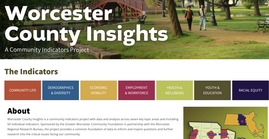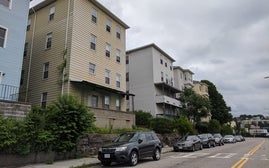Worcester's Downtown Efforts Get Historical Perspectives
Does a new downtown Worcester have potential through a mix of commercial and residential development?
If some of the recent successes of Providence and Lowell can be imitated, then the answer to that question is yes.
Officials close to the downtown redevelopments of those two cities addressed those efforts this morning amid the backdrop of the ongoing redevelopment in downtown Worcester at a forum sponsored by the Worcester Regional Research Bureau.
Both Adam Baacke, assistant city manager for Lowell, and Francis J. Leazes Jr., a professor at Rhode Island College who has studied Providence's revitalization efforts since the 1970s, stressed the value of public-private partnerships in downtown redevelopment projects. Leazes said governments and private sources combined to raise $1.1 billion for Providence's efforts from 1981 to 2000, which included new retail developments such as Providence Place, and the relocation of a stretch of Interstate 195 through the Rhode Island capital that opened up 45 acres of developable land along the city's waterfront.
Baacke, who pointed to the redevelopment of close to 90 percent of the Merrimack Valley city's old mill buildings as a cornerstone of Lowell's success, said government subsidies are critical in downtown revitalization projects because "development costs generally exceed market returns" for projects in "gateway" cities such as Worcester. He pointed specifically to tax credits for the preservation of historic structures as a key source of funding.
Baacke said retail components of downtown projects need to focus on "lifestyle amenities" within walking distance for residents, such as fitness centers, restaurants and smaller stores, rather than the larger retail outlets that dominated the bustling downtowns of the mid-20th century. "That ship has sailed," he told the gathering of about 50 at the Massachusetts College of Pharmacy and Health Sciences building on Foster Street.
Tim McGourthy, Worcester's chief development officer, and moderator of today's discussion, called downtown "the heart" of Worcester.
"Right now, downtown is not the central meeting place for Worcester. How do we transform that?" he asked.
He cited an estimated $2 billion now in the development pipeline for projects such as the CitySquare development, Gateway Park, the downtown theater district and the building of a new transportation hub for the Worcester Regional Transportation Authority. "We need a place where people can live and work," he said. "That makes downtown very important."
Read more













0 Comments